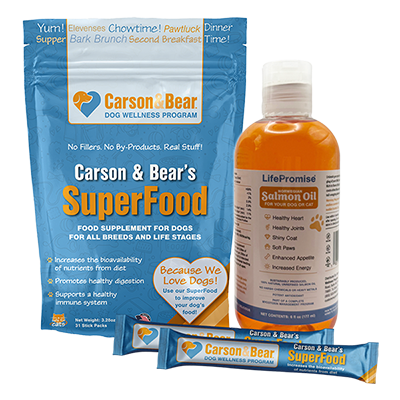Thinking about switching your dog’s food from the usual dry food to something fresher? You’re not alone! More and more pet parents and Veterinarians are considering fresh, whole food diets for dogs. As a Veterinarian, I’m often asked about this, and I’m here to help you understand what these diets are, why they might be good for your dog, and things to watch out for.
The Benefits of Fresh Dog Food:
Fresh and whole food diets are like home-cooked meals for your dog. They use real, recognizable ingredients like meat, veggies, fruits, supplements and sometimes grains, and skip the processed stuff and artificial additives you might find in some store-bought dog foods. Here’s a breakdown of some of the awesome benefits that can come from feeding your dog fresh food:
- Easier to Digest: Think about it this way: would you rather eat a fresh salad or a processed energy bar? Fresh ingredients, especially meat and veggies, are easier for dogs to break down and absorb than the processed stuff in some dry food. This means your dog gets more nutrients out of their food and might have fewer tummy troubles like gas, bloating, and diarrhea.
- Healthier Skin and Coat: When correctly balanced by a veterinarian, fresh food is packed with good fats (like Omega-3s) and other nutrients that help keep your dog’s skin healthy and their coat shiny. Many owners see a big improvement – less itching, less shedding, and a beautiful glossy coat – after switching to fresh food.
- More Energy and Pep: Because fresh food is full of unaltered nutrients and doesn’t have fillers or artificial stuff, your dog might have more energy and be more playful. They’ll be ready for walks, games of fetch, and just enjoy life more! It’s like upgrading from regular gas to premium fuel for your dog’s body.
- Weight Control: Fresh food diets should be tailored to your dog’s specific needs – their age, breed, activity level – so you can help them stay at a healthy weight. It’s about controlling the calories and picking the right ingredients, just like a healthy diet for us!
- Fewer Allergies: Some dogs are allergic to things commonly found in commercial dog food, like certain grains or proteins. Fresh food lets you pick exactly what goes in, so you can avoid those triggers and help your dog feel better. No more itchy skin or upset stomach!
- Cleaner Teeth: Chewing on fresh food, especially raw meaty bones (with your veterinarian’s okay and guidance because not every bone is suitable), can help scrape plaque and tartar off your dog’s teeth.
Fresh Dog Food: Things to Think About
Fresh food sounds great, but it’s important to be informed and consider a few things:
- Balanced Diet: Just like we need a variety of foods to stay healthy, dogs do too! It’s super important to make sure your dog’s fresh food has all the nutrients they need, like the right amounts of protein, fat, carbs, vitamins, and minerals. Talk to your Veterinarian to get a plan that’s perfect for your dog.
- Food Safety: Be careful when handling and preparing fresh food, especially raw meat, to avoid bacteria that could make your dog sick. Wash your hands well, keep all surfaces and utensils clean, and store food properly in the fridge or freezer.
- Cost: Fresh food can be more expensive than dry food. The price depends on what ingredients you buy and how big your dog is. But many owners think the health benefits are worth it – it’s like investing in your dog’s future well-being!
- Time: Making fresh food takes time and commitment. You’ll need to shop for ingredients, prep them, and portion out meals. If you’re short on time, there are pre-made fresh food options available, or you can cook in batches and freeze portions for later.
Debunking the Myths: Separating Fact from Fiction
There are some common misconceptions about fresh food diets for dogs. Let’s clear those up:
- Myth: Raw meat is dangerous: While there’s a small risk of bacteria in raw meat, many dogs thrive on raw food diets when handled safely. Talk to your Veterinarian about whether raw is right for your dog.
- Myth: Fresh food is too complicated: It might seem daunting at first, but with a little planning and guidance from your veterinarian it’s totally doable!
- Myth: My dog is fine on dry dog food: While many dogs do okay on dry dog food, fresh food can offer a whole new level of health and vitality. It’s like the difference between surviving and thriving!
Switching to Fresh Food: Tips for Success
Ready to give fresh food a try? At Carson and Bear, we have a sixty-day challenge fresh pet food challenge to help make the transition. Here are other ways to also make the transition a success:
- Talk to Your Veterinarian: This is the most important step! Before you make any big changes to your dog’s diet, talk to your veterinarian. They’ll make sure the food you choose is safe and healthy for your dog’s individual needs. I want to emphasize that the diet plan must be entirely designed by the veterinarian, including the selection and balancing of ingredients. The vet will calculate the calories and ensure the food is tailored to the dog’s specific needs. It is also essential that the recipes provided by the vet are followed precisely, with no substitutions, and that exact amounts are measured using scales and measuring cups.
- Go Slow: Introduce the fresh food gradually over a few days or weeks. Mix a little bit with their old food at first, then slowly increase the amount of fresh food until that’s all they’re eating. This helps their tummy adjust. Your vet will provide instructions for the correct and gradual transition.
- Watch Your Dog: Keep an eye on your dog’s appetite, digestion, energy levels, and overall health during the transition. If you notice anything unusual, call your veterinarian.
- Mix it Up: Variety is the spice of life! Offer different ingredients so your dog gets a wide range of nutrients. Change up the proteins (chicken, beef, fish), veggies, and fruits to keep things interesting and avoid any deficiencies. Your vet should also plan the ingredients rotation.
- Consider Pre-Made Fresh Food: If making food from scratch is too much, look into pre-made fresh dog food. Many companies offer healthy and convenient options that are already balanced and ready to serve.
Fresh and whole food diets are a fantastic way to nourish your dog and help them thrive. They offer real, recognizable ingredients, skip the processed stuff, and can lead to improvements in everything from digestion to allergies to overall energy and vitality. But remember, it’s crucial to talk to your veterinarian, ensure the food is balanced, and be mindful of food safety. With a little planning and effort, you can give your furry friends the best possible food and set them up for a long, happy, and healthy life!



